The ongoing demolitions of homes in Athi River built on land belonging to East Africa Portland Cement Company has sparked a painful and divisive spectacle.
The image of a middle-aged man, helplessly watching his hard-earned bungalow crumble under the weight of bulldozers, is a heartbreaking symbol of a complex issue that has affected countless families.
These wrecking have left many innocent people, who believed they were investing in a secure and legal property, homeless and devastated.
ALSO READ: The public was warned in 2016 not to purchase Portland Cement firm’s land
The situation in Athi River is just an example of a larger problem within Kenya’s real estate sector.
While some of those living on the disputed land may indeed be encroachers, it is evident that a significant number of individuals were unwittingly caught up in the web of unscrupulous land brokers and cartels.
These individuals were duped into believing that the land was available for public ownership when, in fact, it was not.
Many of these victims invested their hard-earned money, often paying exorbitant sums for what they believed were legitimate properties.
The existence of a fraudulent market for land deals is a clear indication of a growing cancer in the property market.
It raises legitimate questions about the involvement of corrupt officials and the need for accountability within the government’s ranks.
The demolition of these homes in Athi River should be a turning point. It’s not just about rectifying past wrongs but also about ensuring that such incidents do not recur.
Even as we urge potential land buyers to be extra vigilant and to conduct due diligence before committing their money, we believe the greater duty of care vests in the government.
The government’s duty cannot and should not only be to demolish illegal structures but also to dismantle the shady networks that exploit unsuspecting land buyers.
It is the government’s duty to restore public confidence in the land market.











